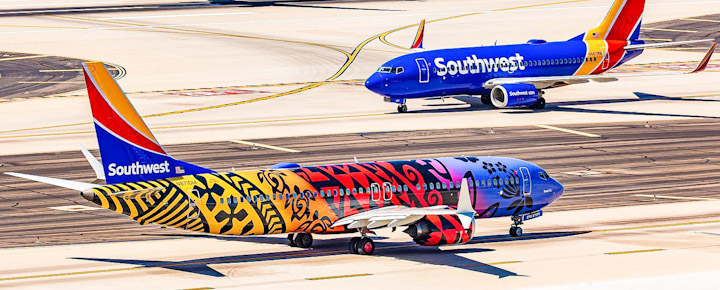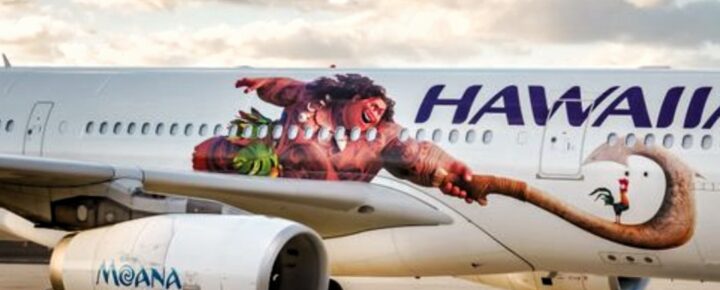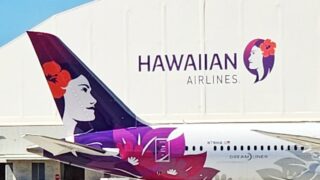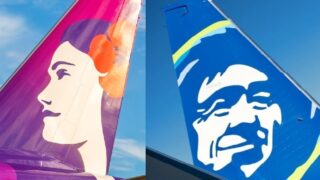The recent termination of a Hawaiian Airlines customer service agent, Tracy Sielega, for violating the company’s tattoo policy has sparked broader industry and cultural debates. Her case highlights tensions between professional appearance standards and cultural expression, especially for airlines flying to Hawaii, a destination renowned for its deep Polynesian heritage and longstanding tattoo traditions.
As these issues surface, the question remains: how do such policies align with modern inclusivity and Hawaii’s unique cultural identity?
Airline tattoo policies: How does Hawaiian Airlines compare?
Hawaiian Airlines enforces strict appearance standards for its guest-facing employees, such as flight attendants and customer service agents, requiring all visible tattoos to be fully covered. While Sielega complied with these rules by using gloves and makeup, her termination followed the visibility of her tattoo at a non-work event, raising questions about the scope of such policies.
Here’s an overview of tattoo policies from other airlines serving Hawaii:
Southwest Airlines last year updated its guidelines to allow small, non-offensive tattoos, provided they are not on the face, neck, or hands. But not only that, Southwest unveiled a tattooed Hawaii livery.


United Airlines similarly revised its policy, permitting visible tattoos smaller than a work badge, so long as they are non-offensive and in discreet areas.
American Airlines and Delta Air Lines maintain conservative standards, requiring full coverage of any tattoos for guest-facing roles.
Alaska Airlines, which recently acquired Hawaiian Airlines, allows small visible tattoos as long as they are non-offensive and not located on the face, neck, or hands.
Hawaiian Airlines’ policy reflects older industry norms but faces unique scrutiny due to the airline’s cultural branding. Hawaiian prominently incorporates Polynesian imagery, including tattooed characters, into its marketing, as seen with its Moana-themed aircraft. This juxtaposition has led to criticism that the company sends mixed messages about celebrating culture while restricting its expression among employees.
The cultural and travel implications.
Hawaiian Airlines plays a critical role in connecting visitors to the islands and shaping their first impressions of Hawaii. For many travelers, the Hawaiian experience begins when they board the plane, with the airline’s branding promising a connection to Polynesian culture. However, policies restricting employees from visibly expressing their heritage can appear contradictory to the values Hawaiian Airlines promotes externally. This contrasts sharply with Alaska Airlines’ more relaxed tattoo standards, raising questions about consistency across the newly merged company.
For Hawaii’s travel industry, these debates go beyond corporate policies. Visitors are increasingly drawn to sustainable and community-focused tourism, which emphasizes authentic cultural experiences. Allowing employees to showcase culturally significant tattoos could align Hawaii’s tourism sector with these evolving expectations.
Airlines reevaluating policies: a path forward?
The ongoing conversation about tattoo policies provides an opportunity for all airlines flying to Hawaii to reassess their standards. Airlines like Southwest and United have already modified their guidelines, demonstrating that professional standards and cultural inclusivity coexist. Hawaiian Airlines, alongside Alaska Airlines, could consider adapting its policies to permit tattoos with cultural or personal significance, provided they adhere to criteria of professionalism and respect.
Such changes could position Hawaiian Airlines as a leader in cultural inclusivity and reinforce its reputation as a steward of Polynesian heritage. By aligning internal practices with external branding, the airline could further its mission of sharing the richness of Hawaii’s traditions with the world.
The cultural importance of Polynesian tattoos in Hawaii.
Polynesian tattoos carry profound significance, often as sacred symbols of identity, achievements, and familial connections. For Sielega, her Samoan tualima honors her father’s health struggles and her caregiving role. She described it as a deeply personal and cultural emblem, saying, “I got it done to embrace my culture, to embrace my dad and his health and everything that he’s struggling with.”
These tattoos are not just body art, but historical markers of lineage and pride passed down through generations. Recently, Polynesian tattooing has experienced a revival as individuals reconnect with their heritage. Hawaii has embraced this resurgence as a cultural epicenter of Polynesia, making these practices an integral part of the island’s identity and appealing to visitors seeking authentic cultural experiences.
Conclusion.
The debate over airline tattoo policies underscores broader questions about cultural expression and workplace inclusivity. For airlines like Hawaiian, the challenge is operational and symbolic, reflecting their role as ambassadors of Hawaii’s unique culture. Balancing professionalism with respect for tradition could strengthen their connection to the islands and align with travelers’ expectations of seeking authentic experiences.
As airlines navigate these evolving norms, this story offers a moment of reflection for Hawaiian Airlines and the entire travel industry. It highlights the importance of celebrating heritage while adapting to modern workplace and cultural values, ensuring that Hawaii remains a place where tradition and innovation coexist.
Get Breaking Hawaii Travel News







I was a flight attendant for a wonderful USA based Legacy airline for over 50 years. I retired in 2020. I knew the policy re tattoos prior to completing my application so I made choices accordingly. My goal was to insure my career with my first choice of all USA based airlines was never in jeopardy. Thankfully I was successful. It is indeed all about choices. But now she can proudly wear her tattoos without and concern re employment. I am definitely not anti-tattoo. I received my 5 tattoos in one day when I was 40. I had one ‘touched-up’ a few years ago. All are discreetly placed. My career was important to me so I planned accordingly. I respect honoring heritage but I also realize the loss of gainful employment can be life-changing. Priorities are important. Choose wisely.
Aloha,
As someone of Hawaiian descent and with deep ties to Hawaiian Airlines through my father’s 35 years of dedicated service, I am deeply disheartened to learn about the termination of an employee due to cultural tattoos. Polynesian tattoos are not mere body art; they are sacred symbols of our heritage, identity, and pride.
Hawaiian Airlines is not just an airline; it represents the culture and spirit of Hawaii to the world. To terminate an employee for honoring their cultural roots feels contrary to the values of inclusivity and respect that Hawaii embodies.
In Hawaii, the concept of aloha is more than a greeting—it is a way of life that embraces understanding, acceptance, and unity. As an airline that connects people to and from Hawaii, Hawaiian Airlines should lead by example in embracing and respecting Polynesian traditions.
I urge the company to review its policies to ensure they honor the rich cultural diversity of its employees and the communities it serves.
Heres my take:
Between 12 and two years ago most people would have sided with the employee especially with legitamate cultural meaning behind the tattoo.
Today the pendulum has swung the other way. And Ownership, C-suite, and front line employees have had enough ‘cultural’ or ‘individuality’ tip toeing. As an employer ‘I pay the freight’ Period. I want my staff in a specific uniform operating and conducting themselves in the manner how ‘I’ as the employer want ‘my’ brand represented.
Dont like it? Fine. I wish you sucess starting your own company and paying your own freight.
I was born and raised between Manu’a, American Samoa and Honolulu Hawaii. This hand tribal tattoo on women hands is something I had never seen. This story is irrelevant to Culture. More of a personal preference of the location of her personal tattoo.
Polynesian/real cultures Only tattoos should be allowed and covered when possible and at work only, its the other stuff like the offensive drug, gangs, neck tattoos, a million nose, ear rings, tongue, lip piercings should not be allowed but also its the airlines rules so just deal with it.
A non work event ? WT__..
Yes these are the important things. The should be allowed nose rings, lip rings and whatever else todays generation wants to crow foul about.
This is not something ‘today’s generation’ is complaining about. It is an issue with an airline which uses Hawaiian culture to draw tourists to the islands and make money, while not respecting real Hawaiian culture or the native people. Native Hawaiian people of all ages have protested the inappropriate use of their culture by outside companies to make money off of their land
As I flew to Hawaii on Thanksgiving weekend, I experienced my first flight there with an Alaskan crew and plane. One of the flight attendants had marvelous full sleeves. I complimented them and asked about them. He thanked me and said they were done in Japan when he was around 20. They didn’t appear to disturb any of the passengers and he was very skilled and relaxed at his work.. I am being intentionally vague about the days and routing so as not to cause trouble for him. Why would an airline supporting the release of the new Disney film run from the positive attention and cultural understanding they could share? I hope the union makes an issue of this, even in the uncertainty of the merger.
This makes me wonder just how Hawaiian, Hawaiian Airlines is?
Call me a cynic but it could nust be an excuse for a headcount cull post Alaska take over.
Hmmmmm, I would agree that there is a heritage of tattooing in Polynesian culture. Tattooing goes way back, and is practiced in a number of societies around the world, but, until relatively recently, had not been widely practiced to the extent it is in Western society, especially with such abandon. Small tattoos in ‘covert’ places, like a rose on a breast, or a heart on a shoulder, were not uncommon, but today’s tattoos are often full ‘sleeves’, or thighs, hands & necks, etc.. They have become ‘stylish’ and ‘trendy’ as a means of ‘self-expression’. How many persons used to do this before it became ‘trendy’, claiming it is part of their ‘personsa’?
How very Hawaiian of Hawaiian Airlines but hardly surprising considering how they moved their reservation system and major aircraft services with all of those jobs out of Hawaii. They have really mastered the not so fine art of speaking and lying out of both sides of their mouth! Hypocrisy at its finest!
A lawyer told me that in my state employers have the power to terminate anyone “at will” and have a right to do so without disclosing any reason. Not everyone knows what a tattoo is really about with all the street graffiti sprayed in most cities. I would think the information would be in the grooming, appearance standards listed in the employee handbook.
Oregon is the same way. You accept a job with a Private employer. They will not hire you if they don’t like your looks.
Don’t like their rules? Then don’t bother applying. Work in construction or choose another vocation.
Hawaiian has always been consistent in enforcement of this policy.
Implementation at a non work event is a little over the top. But I have heard of people getting canned for things done on social media. Heck, you cannot even buy alcohol while in any uniform.
I agree, how a person appears ‘off-duty’ is there business, as long as it does not embarrass the company. Visible tattoos on their ‘off-time’ is the employee’s business, unless they are wearing the company uniform. Businesses have no right to ‘control’ this kind of thing, as it is a business invasion of their private lives, and might involve legal action by the (former?) employee for unjust termination.
As long as a potential employer clearly informs a prospective employee of their dress code and standards, including visible tattoos, that employee then has the opportunity to decide which has a greater priority – working for that particular employer and complying with their standards, or prioritizing tattoos or other appearance items. I think it is very reasonable for an employer to require a standard of appearance for their employees, especially those who deal directly with the public.
There seems to be a general debate here on ‘company standards’ versus ’employee individual rights.’ Some seem to feel the latter trump the company’s policies. When you join a company, they give you your job description and what standards you are required to meet. If those conflict with your own personal ideals/philosophy/mores, then you have the right to say, “No thank you.” and seek employment elsewhere. You do not have a ‘right’ to work there, under your requirements. It’s their company, they set the standards. If, however, they hire you and they later change the standards, then you have a right to challenge them. This becomes a problem in particular when things like acceptable public grooming standards change.
Hi Akane. Younger generations always want to be different. My personal view is tattoos are fine if they are covered but not otherwise. As with long hair, it is fine if worn tidily but not if it looks like you have just been surfing. Flight attendants like Nurses, Doctors etc are professionals and need to look the part. But that is just me. I think Hawaiian Airlines Crews always do look professional unlike some of the mainland airlines.
Was termination of Tracy Sielega the right thing to do. Yes, Airline employees that are on the job need to look and act professional when in the public’s view. Visible tattoos on airline employees in my opinion are not professional. I consider myself a regular visitor to the island of Kauai and I enjoy seeing the tattoos that represent Hawaiian Heritage and Culture. I see the pride in those when wearing them. It shows where they and their ancestors came from. That is only one of the many reasons I come to the island of Kauai. If someone wants to show the world what their ancestry is about I applaud them. That is their history, don’t take it away. If Hawaiian Airlines is going to advertise based on the Heritage and Culture of the islands then it should be acceptable for their employees to be able to show their pride in their Hawaiian heritage as well . I feel that any tattoo on the face, neck, or hands should be acceptable, if they cover no more than 25 percent of those extremities.
How does the fact that the termination was based upon something that took place Away from work while off duty!? How is That even remotely fair?
Hawaiian Airlines has a far better tattoo policy than Alaska Airlines, or Southwest Airlines therefore i would be far more inclined to fly and spend my airlines dollars with Hawaiian Airlines over Alaska Airlines or Southwest Airlines. Let’s hope Alaska figures this out and goes traditional rather than scruffy during their merger process. Alaska’s standards went a bit downhill with their merger with Virgin America, so it will be a breath of fresh air to go back up with the merger of Hawaiian and their ideas in regards to covering tattoos.
Pretty soon, you won’t have a choice. Alaska will own Hawaiian and they will set their own rules.
Southwest allows any size tattoos, including a full sleeve. No visible tats on head, face, neck or chest though.
It is interesting the discussion focuses on the rights and privileges of the employees and the policies of the airline management with no interest in the customer experience. Discreet tattoos are unlikely to offend visitors from California or New York but would be very offensive to a Japanese visitor. Is it not about time airline policies should be focused on the passengers rather than being solely internal. Tattoos are like many items of personal grooming such as hair styles and dress. Whilst tattoos are normally permanent they can be covered in most cases by clothing, gloves and or make up on services where they could cause offense.
Hi Rich.
The perception of tattoos in Japan is definitely generational and changing. Younger people are more inclined to embrace them as self-expression, which runs contrary to older societal norms.